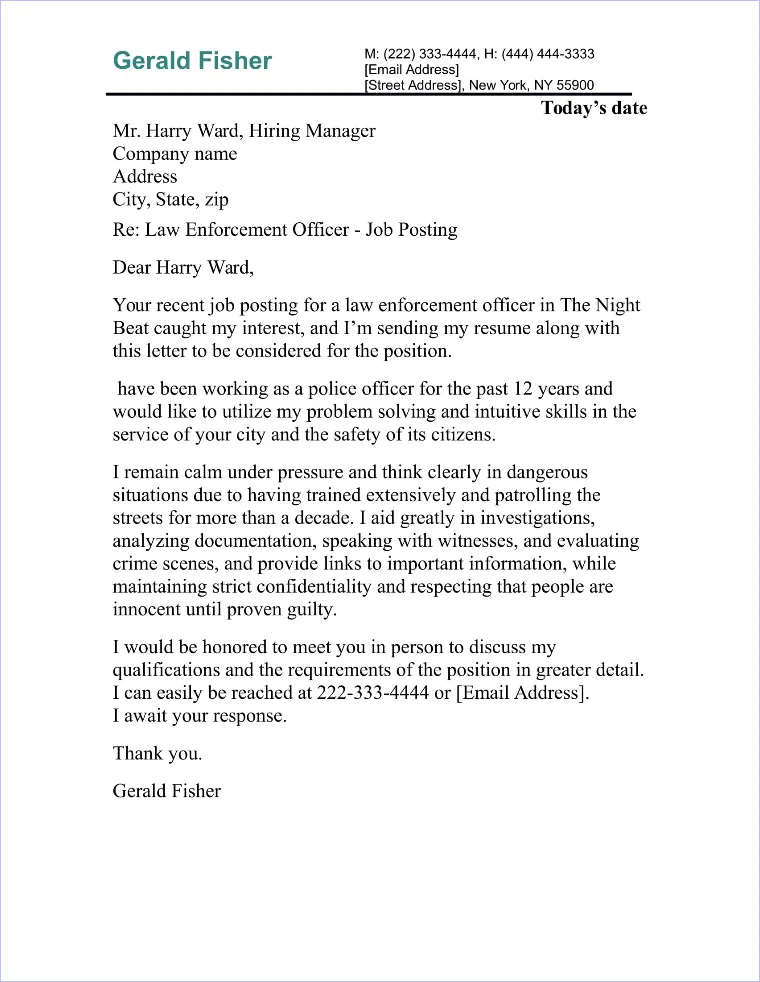Why a Cover Letter Matters for Law Enforcement
In the competitive world of law enforcement, a well-crafted cover letter can be your most important asset. It’s not just a formality; it’s your opportunity to make a strong first impression and set yourself apart from other candidates. While your resume provides a factual overview of your experience, your cover letter allows you to demonstrate your personality, your passion for the field, and your understanding of the specific agency you’re applying to. Think of it as your personal introduction, a chance to tell your story and showcase why you’re the perfect fit for the role and the values of the department.
Understanding the Purpose of a Cover Letter
The primary goal of a cover letter is to secure an interview. It should complement your resume by providing context, elaborating on your skills and experiences, and explaining why you’re interested in the specific position and agency. A cover letter allows you to address any potential weaknesses in your application proactively and to highlight the aspects of your background that align most closely with the job requirements. This document serves as a preview of the professional you are, a persuasive argument for why the hiring manager should consider you for the next stage in the process.
Highlighting Your Strengths
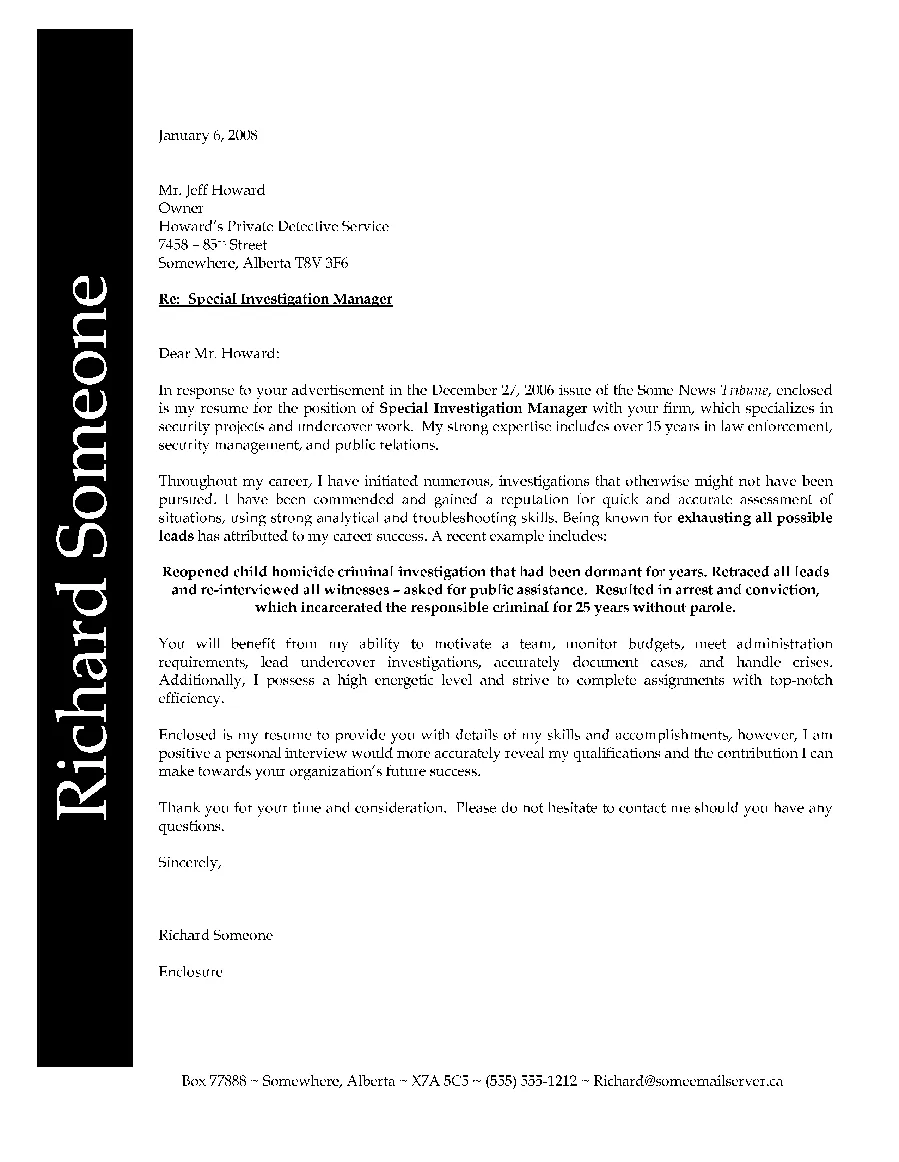
Your cover letter is where you can shine a light on your strengths. Identify the skills and qualities most relevant to law enforcement, such as integrity, communication, problem-solving, and teamwork. Provide specific examples from your past experiences that demonstrate these qualities in action. Quantify your achievements whenever possible. For example, instead of stating “Managed a team,” you could say “Managed a team of five officers, improving team efficiency by 15% through strategic resource allocation.” Remember to align your strengths with the specific needs of the law enforcement agency and the job description.
Researching the Law Enforcement Agency
Before you start writing, conduct thorough research on the law enforcement agency you’re applying to. Visit their website, read news articles about the department, and familiarize yourself with their mission, values, and recent initiatives. Understanding the agency’s specific priorities will allow you to tailor your cover letter to their needs and demonstrate your genuine interest. Mentioning specific programs, community outreach efforts, or recent achievements of the agency in your letter shows that you’ve done your homework and that you’re genuinely interested in becoming part of their team. Show that you have a deep respect for their mission.
Key Elements to Include in Your Cover Letter
A strong cover letter contains several essential elements that work together to create a compelling narrative. These elements provide structure and clarity and help you present your qualifications in a focused manner. Careful attention to these elements demonstrates professionalism and attention to detail, qualities that are highly valued in law enforcement. Let’s explore each of these crucial components to ensure you create a standout cover letter that captures attention and conveys your qualifications.
Contact Information
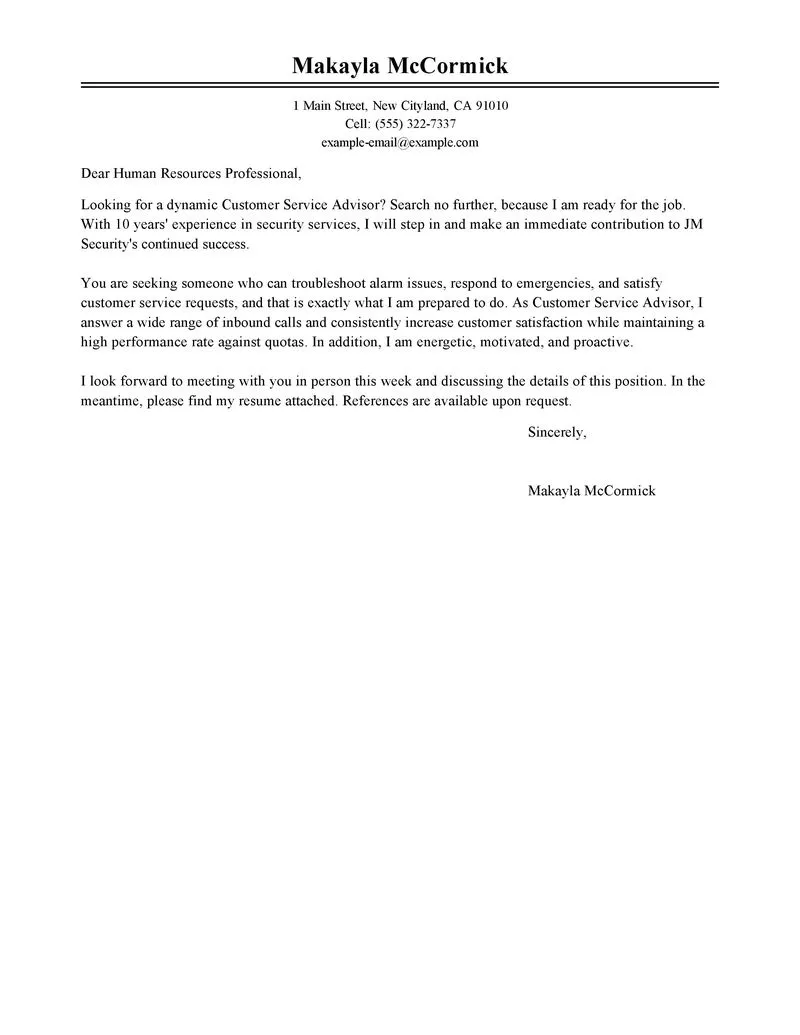
Begin your cover letter with your full name, address, phone number, and email address. This information should be at the top, either left-aligned or centered. Make sure your email address is professional. Using a nickname or a casual email address could create a negative first impression. The hiring manager needs to quickly and easily know how to reach you.
The Opening Paragraph
Start with a strong opening that grabs the reader’s attention. State the position you are applying for and where you found the job posting. Then, briefly explain why you’re interested in the specific agency and why you believe you are a good fit. Show enthusiasm and convey your passion for law enforcement immediately. The opening paragraph sets the tone for the entire letter, so it should be clear, concise, and engaging. Consider starting with a statement about your long-held interest in law enforcement or a brief anecdote that illustrates your commitment to serving the community. Make it personal and memorable.
Body Paragraph 1 Qualifications and Skills
In the first body paragraph, highlight your key qualifications and skills relevant to the law enforcement position. Refer to the job description and identify the most important requirements. Provide specific examples of how you have demonstrated these skills in your past experiences. Quantify your achievements whenever possible. For instance, if you have experience in conflict resolution, describe a situation where you successfully de-escalated a tense situation and the positive outcome. If you have training in specific areas such as first aid or defensive tactics, be sure to mention it. Demonstrate how your skills align with the needs of the agency and the requirements of the job.
Body Paragraph 2 Experience and Achievements
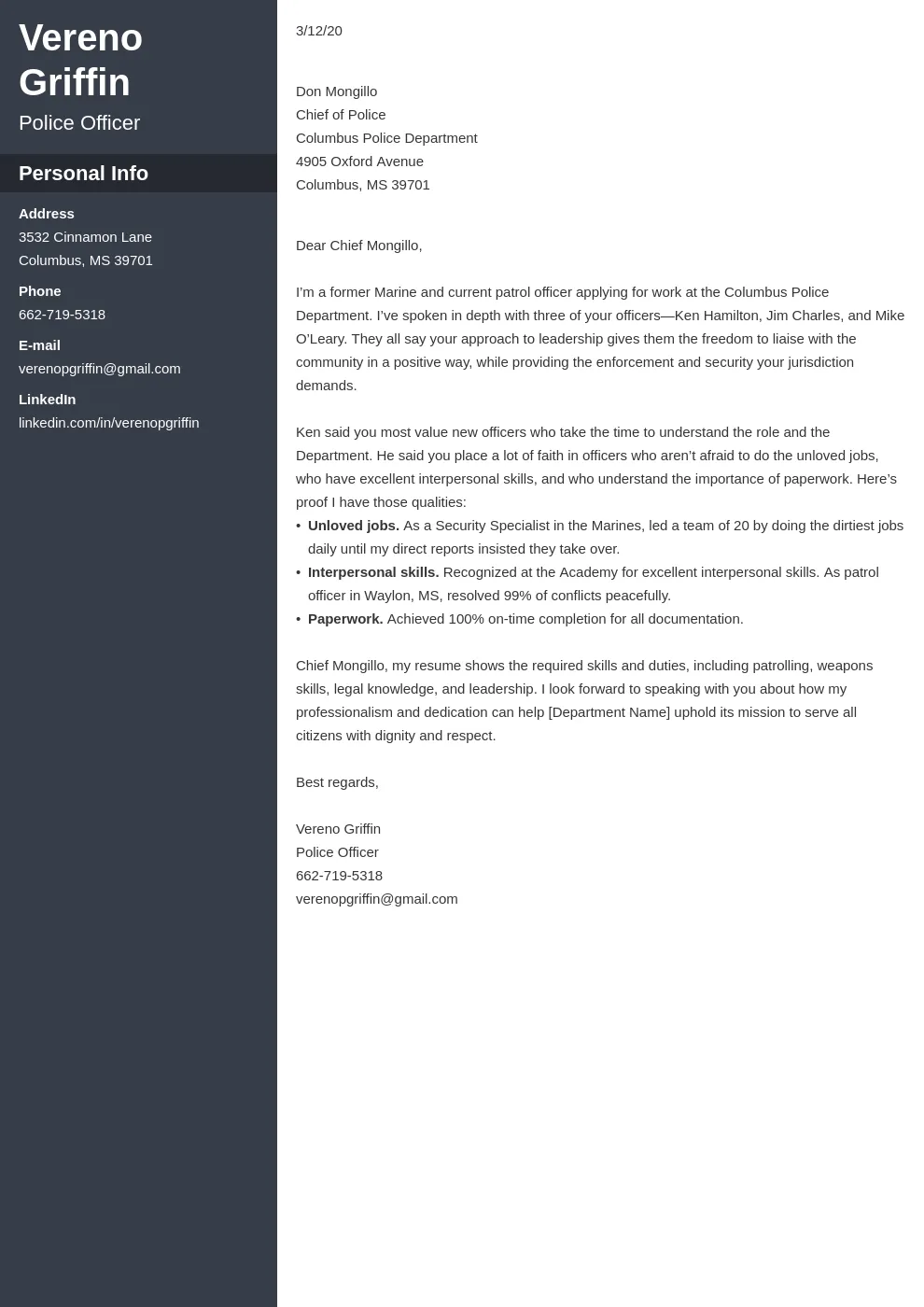
In the second body paragraph, provide more detail about your relevant experience and achievements. Focus on experiences that have prepared you for the role, whether they are professional, volunteer, or academic. Use the STAR method (Situation, Task, Action, Result) to describe your accomplishments. Briefly explain the situation you were in, the task you had to complete, the actions you took, and the results you achieved. This structured approach helps the reader understand the context and the impact of your contributions. Emphasize accomplishments that showcase your problem-solving abilities, leadership skills, and ability to work under pressure. Tie your past experiences to the needs of the law enforcement agency.
Body Paragraph 3 Passion and Motivation
In the third body paragraph, express your genuine passion for law enforcement and your motivation to work for the specific agency. Explain why you’re drawn to this career path and what values align with the agency’s mission. Showcase your understanding of the agency’s values and how you embody them. Highlight any personal connections to the community or any experiences that have shaped your desire to serve and protect. This paragraph is your chance to connect with the hiring manager on a personal level. Demonstrate your commitment to making a positive difference and your enthusiasm for the opportunity to contribute to the team. Show that this is not just a job but a calling for you.
The Closing Paragraph
The closing paragraph should summarize your key qualifications, restate your interest in the position, and express your enthusiasm for an interview. Thank the hiring manager for their time and consideration. Keep it concise and professional. Ensure your closing paragraph reinforces your value proposition and leaves the reader with a positive impression. It should reiterate your strong belief in your suitability for the role and the agency.
Expressing Gratitude
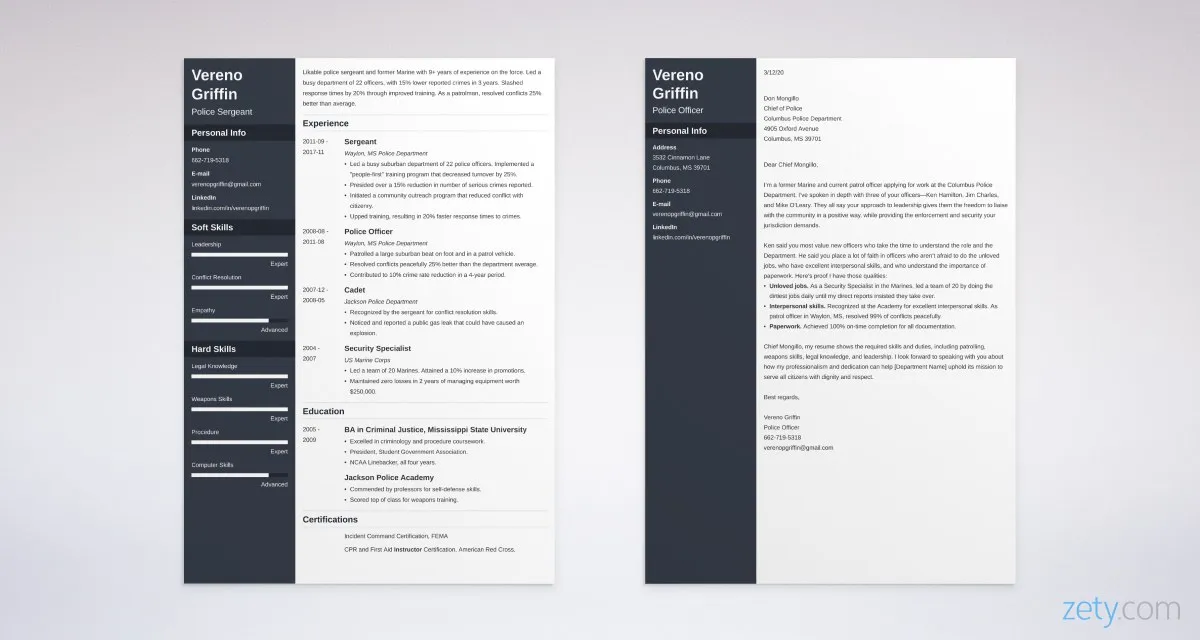
Always thank the hiring manager for considering your application and for their time. This simple gesture demonstrates respect and professionalism. It is a common courtesy that reflects positively on you. Gratitude is a crucial element that creates a positive lasting impression, making you stand out among the candidates.
Call to Action
End your cover letter with a call to action, such as expressing your eagerness to discuss your qualifications further in an interview. Provide your contact information again to make it easy for the hiring manager to reach you. Make it easy for them to take the next step. Reinforce your enthusiasm and demonstrate your initiative.
Formatting Your Law Enforcement Cover Letter
The format of your cover letter is just as important as its content. A well-formatted letter shows that you pay attention to detail and that you respect the hiring manager’s time. It also makes your letter easier to read and more visually appealing. Choosing the right format reflects professionalism and attention to detail. In law enforcement, where attention to detail is crucial, an error-free and well-formatted cover letter demonstrates your commitment to excellence.
Font and Font Size
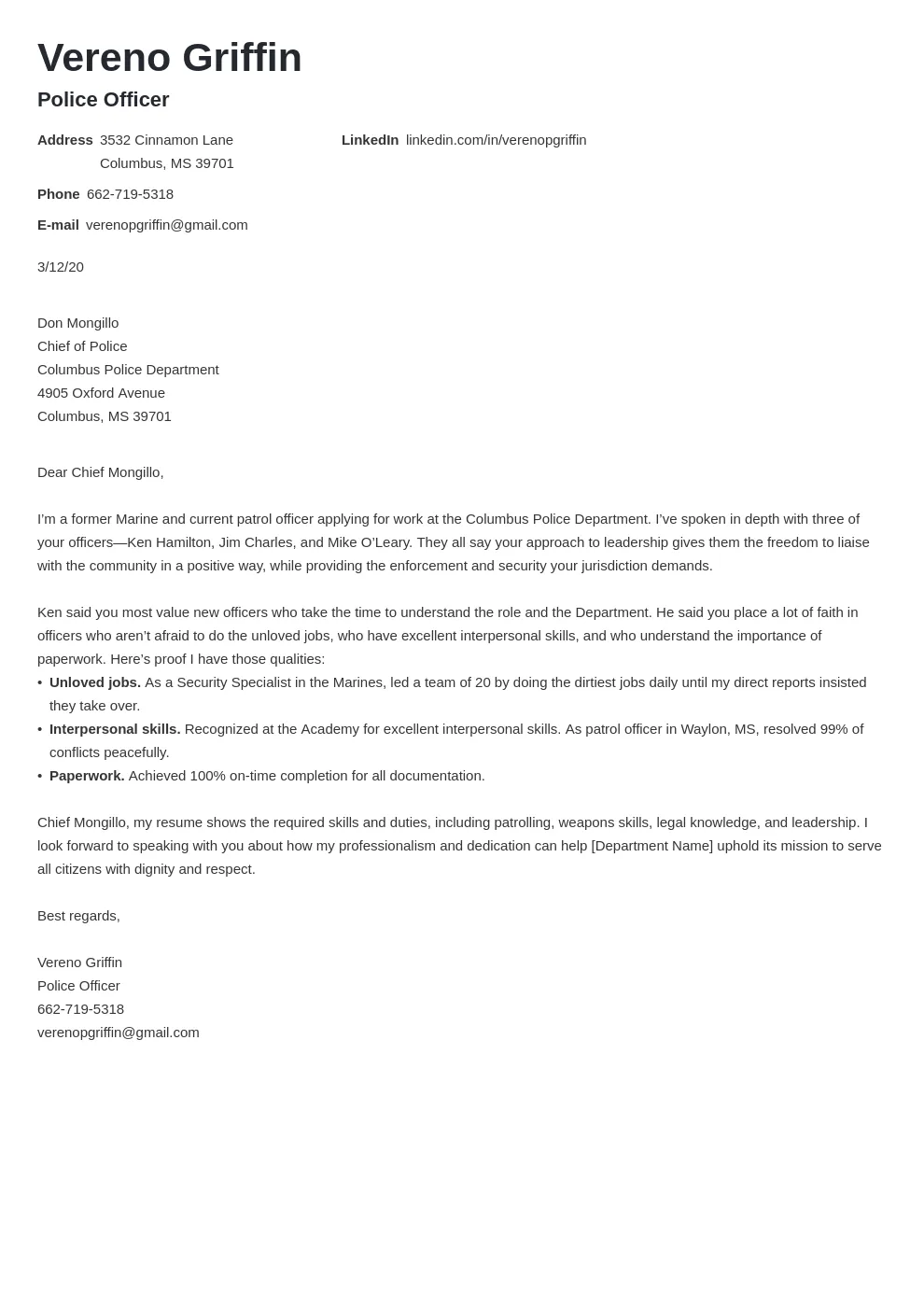
Choose a professional and easy-to-read font, such as Times New Roman, Arial, or Calibri. Use a font size between 10 and 12 points. Avoid using overly decorative or unusual fonts, as they can be distracting. Ensuring your font choice supports readability is key. This ensures your message is easily accessible and projects a professional image. Consistency in font and size conveys professionalism.
Margins and Spacing
Use standard 1-inch margins on all sides of your cover letter. Double-space between paragraphs to improve readability. Proper spacing allows for better visual organization and makes the content less overwhelming. This practice enables the hiring manager to easily read and comprehend the information presented.
Proofreading and Editing
Proofread your cover letter carefully for any typos, grammatical errors, or inconsistencies. Ask a friend or family member to review it as well. Mistakes can damage your credibility, so attention to detail is crucial. A polished cover letter shows that you are detail-oriented. Editing ensures that your message is clear, concise, and professional, enhancing your chances of making a strong impression.
Avoiding Common Mistakes
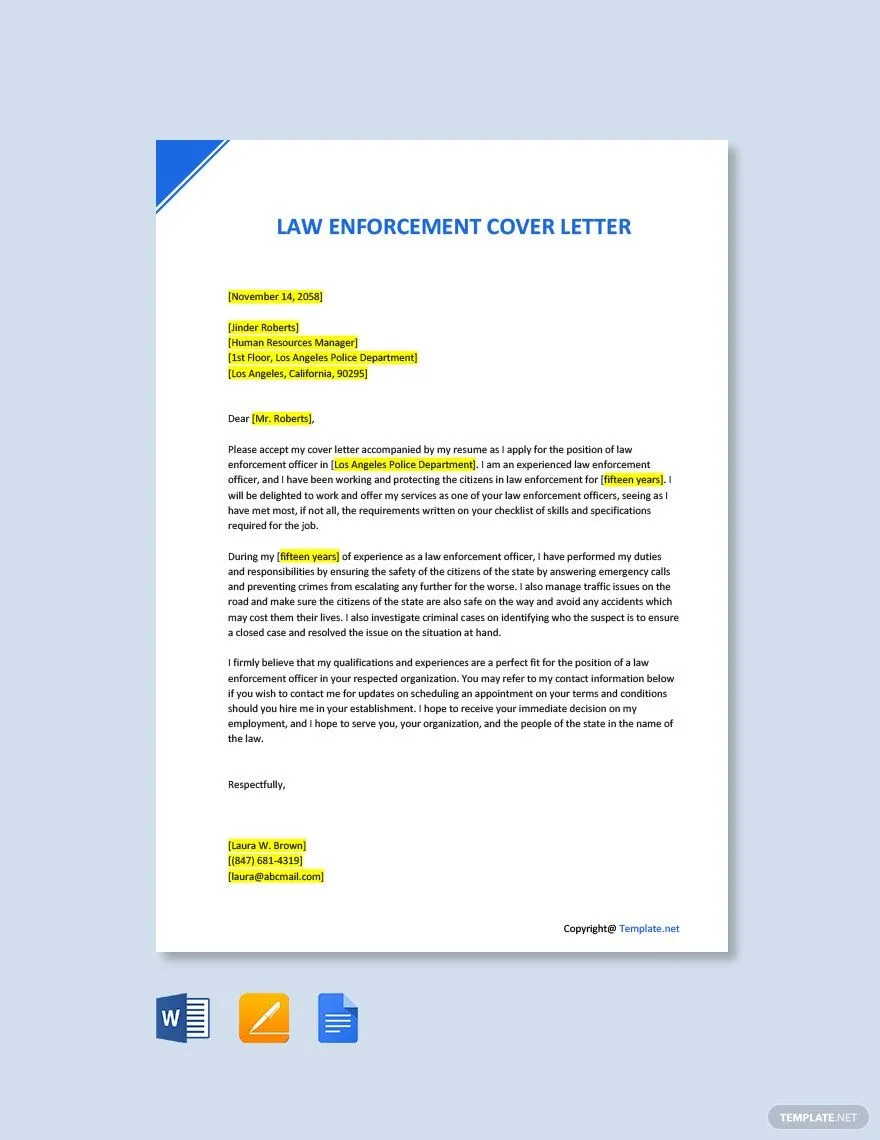
Avoiding common mistakes is essential to ensure your cover letter effectively communicates your qualifications and enthusiasm. Common errors can undermine your credibility and reduce your chances of getting an interview. Being aware of these pitfalls and actively avoiding them can significantly increase your chances of a successful application. Let’s explore the most frequent mistakes to help you create a standout cover letter.
Generic Cover Letters
Avoid using a generic cover letter that you send to multiple agencies. Tailor your letter to each specific job and agency, demonstrating that you have researched the organization and understand their needs. Generic letters show a lack of genuine interest and attention to detail. Tailoring your cover letter demonstrates to the hiring manager that you’ve invested the time and effort. This shows that you genuinely want the job.
Typos and Grammatical Errors
Carelessly written cover letters reflect poorly on your attention to detail and professionalism. Proofread your cover letter meticulously. Use spell-check and grammar-check tools, but also read through your letter carefully. Typos and errors can make you look careless and could undermine your credibility. A polished cover letter shows that you are detail-oriented and committed to excellence.
Failing to Tailor Your Letter
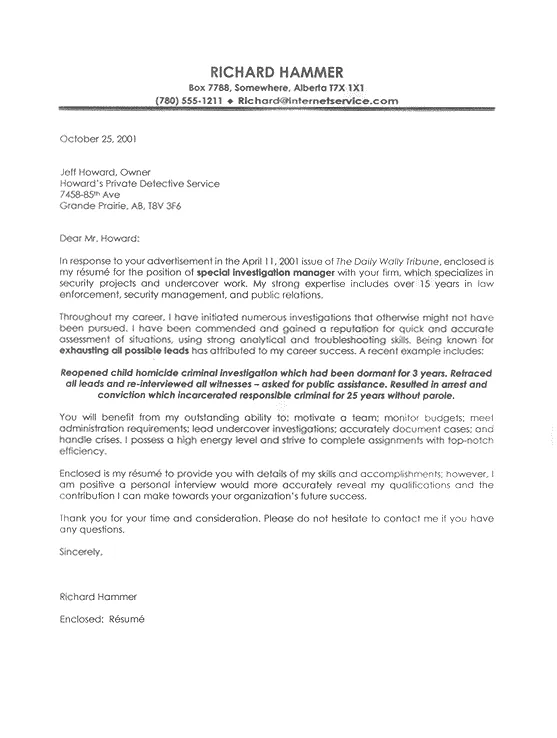
Make sure your cover letter is tailored to the specific job description and the law enforcement agency. Address the specific requirements and highlight the skills and experiences that are most relevant. Failing to do this shows a lack of understanding of the organization’s needs. A tailored cover letter demonstrates your understanding of the agency and your ability to meet their specific requirements.
Reviewing Law Enforcement Cover Letter Examples
Reviewing cover letter samples can provide valuable insights into how to structure your own letter, what language to use, and how to showcase your qualifications effectively. Studying these examples can help you understand best practices and develop a strong, professional cover letter. Many resources offer cover letter samples tailored specifically to law enforcement, providing a practical guide to writing your own letter. These resources are useful for creating a strong cover letter that highlights your strengths.
Cover Letter Sample 1
Here’s an example cover letter that includes the standard information. This sample will showcase an individual who is looking to change careers. Remember, this is only a sample, so you need to adjust it to fit your own experience and aspirations. This sample will showcase an individual who is looking to change careers. Remember, this is only a sample, so you need to adjust it to fit your own experience and aspirations.
Cover Letter Sample 2
Here’s another example of a great cover letter. This sample will be for someone with prior law enforcement or military experience. Remember, you will need to adjust this cover letter to meet your experience and what the department is looking for. This will showcase a candidate with experience ready to work. Remember, you will need to adjust this cover letter to meet your experience and what the department is looking for.
Cover Letter Sample 3
This cover letter sample focuses on a candidate who has a lot of volunteer experience. Review the different sections and adjust the sample to fit your specific details. Remember, you will need to adjust this cover letter to meet your experience and what the department is looking for. This will showcase a candidate who has a lot of volunteer experience, focusing on helping the community.
Final Tips for a Strong Cover Letter
In addition to the key elements and formatting guidelines, these final tips can help you write a compelling cover letter. A well-crafted cover letter, that demonstrates your understanding of the agency, can be very effective. Focusing on these final elements can ensure that your cover letter is powerful. These final elements will make the hiring manager want to interview you.
Tailor to Each Job
Customize your cover letter for each job you apply for. Research the agency and the specific requirements of the position. Show that you understand what the agency is looking for and how your skills align with their needs. This demonstrates your genuine interest and commitment to the specific role. Customizing each cover letter to fit the specific requirements is a key to success.
Show Enthusiasm
Express your enthusiasm for the role and the agency. Let your passion shine through. A positive attitude can be very attractive to hiring managers. A genuine interest can greatly improve your chances. Your enthusiasm should be clear in your writing and tone.
Keep it Concise
Keep your cover letter concise and to the point. Hiring managers are busy. They want to see that you can communicate effectively and that you respect their time. Make every word count. Focus on the most important information and use clear, concise language. A concise cover letter shows that you can focus on your key message.
By following these guidelines, you can create a compelling cover letter that highlights your qualifications, demonstrates your passion, and increases your chances of landing an interview for a law enforcement position. Remember, your cover letter is your chance to make a memorable first impression and set yourself apart from the competition. Good luck!
